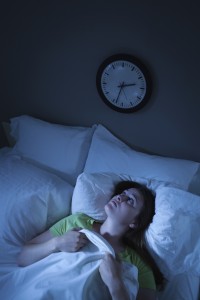Okay. Admit it. You check e-mails or post to Facebook or Twitter just before you hit the sack; read or play games on a digital device in bed; and probably even sleep with your smartphone so you don’t miss any texts.
Being “always on, always available” has become the norm in the 24/7 digital world and it’s wreaking havoc on our sleeping patterns—raising risks for everything from high blood pressure and anxiety to heart disease and diabetes.
“The consistent, cumulative lack of sleep is making millions of people very irritable, leading to anxiety, depression and metabolic changes,” says Dr. Jhansi Nalamati, a board-certified sleep specialist and attending physician at Jacobi Medical Center and assistant professor of medicine at Albert Einstein College of Medicine.
Dr. Nalamati and other specialists are particularly concerned about a recent study suggesting that the nation’s 21 million shift workers may be at even higher risk.
The study, performed by researchers at Boston’s Brigham and Women’s Hospital and published in Science Translational Medicine, sheds light on what happens to the body when it is subjected to irregular sleep patterns. Many shift workers work rotating shifts—for example, three nights on, followed by two nights off, then day shifts. This inconsistent work pattern throws off balance the circadian rhythms that regulate when the body becomes sleepy.
The nearly six-week study, on 21 healthy adults, was designed to simulate shift work. For the first three weeks, the subjects were allowed to sleep normally. But for the next three weeks, they were allowed to sleep only 5.5 hours in any 24-hour period and their sleep time varied between nights and days.
Within just days of the disruption of sleep patterns, the glucose rates of subjects shot up—staying elevated much longer than normal, demonstrating that the pancreas was not producing
enough insulin.
Even though the study participants ate a controlled diet, researchers saw their metabolic rates drop 8 percent—the equivalent of a 10- to 12-pound yearly weight gain if continued over a longer term. An even greater cause for concern: three of the subjects became prediabetic after three weeks.
Though the glucose levels of all the study participants returned to normal nine days after the subjects resumed normal sleep patterns, Dr. Nalamati points out that for those who already have prediabetes or diabetes, irregular sleep patterns make “controlling diabetes extremely difficult.” She says a tired body “craves foods high in sugar and carbohydrates that can raise glucose rates.”
Out-of-sync sleep patterns also impair judgment about proper nutrition. The hungry shift worker is much more likely to reach for a doughnut than for an apple. The irony, Dr. Nalamati points out, is that the foods the sleep-deprived often turn to for energy make them feel more tired due to sugar highs and sugar crashes.
Sleep specialists stress that all adults need to take sleep warnings seriously, whether they do shift work or not.
So what can you do to get a better night’s sleep on a consistent basis?
“First,” Dr. Nalamati advises, “establish a set routine that allows you to wind down before bedtime. The biggest problem is that people are activating their brains right until the moment they get into bed. Your brain can’t just shut down. It needs to be slowly weaned off activity.”
Here is a list of additional steps to improve the quality of your sleep:
• Don’t exercise within three hours of going to bed. Exercise is best in the morning or late afternoon.
• Don’t eat heavy meals before bedtime. Allow at least two hours between dinner and bedtime.
• Reserve the bedroom for sleep and sex. Keep the computer, TV and other electronic devices (including your smartphone) in another room to avoid temptation. (In case you’re wondering, experts say a healthy sex life is unlikely to turn you into an insomniac.)
• Maintain the same bedtime and wake time every day. Shoot for an average of seven to nine hours of sleep daily.
• Whether you do shift work or not, sleep in a cool, quiet room with room-darkening shades or blackout curtains to block light that might wake you earlier than normal.
• If you have trouble falling asleep, try listening to “white noise” or soothing music with no lyrics.
• Don’t toss and turn. If you can’t fall asleep after 30 minutes, get out of bed and do something that will relax you, such as reading, meditating or eating a piece of fruit. Low-acid fruits such as apples can be helpful. When you feel tired again, head back to bed.
• After setting your alarm, turn the alarm clock away from your view so you don’t know what time it is. Staring at the clock and thinking you’ve woken up too early or too close to your appointed wake-up time can increase anxiety.
• Finally, if you are having problems falling asleep or staying asleep, get help. An evaluation by a sleep specialist can help diagnose sleep apnea or other serious conditions.
The bottom line: sleep may be boring but getting enough of it may improve your quality of life. Those texts, posts and e-mails will still be there when you wake up.
What do YOU do to get a better night’s sleep? Tell us in the comments below.




Comments on this entry are closed.
My husband and I disagree on what digital devices are allowed in bed. I say (almost) none. My work life is pretty much all digital, all the time, so I make a point of leaving my iPhone and iPad downstairs. I do read in bed on my Kindle. My husband, on the other hand, doesn’t have much time during the day to check his email and reply (usually to family members). So he brings his iPhone into bed and often his iPad too. It drives me crazy – ! What do the experts say about this?? 🙂
Thanks for your thoughtful comment. Sorry to hear about this quandary – this unfortunately – is common.
Short of erecting a 6-foot-high barrier between you and your husband in bed, sleep experts say there’s little you can do to resolve this situation if you can’t reach a compromise.
Here’s a suggested approach. If your husband’s digital device use is causing you difficulty falling asleep or staying asleep, and you’re convinced the device use is to blame – tell him it’s medically necessary for these devices to be banned from bed. However, you need to be willing to surrender your Kindle to the gods on the first floor – outside the bedroom.
If his use is merely an annoyance, how about meeting half way? He agrees to reduce his digital device use in bed to 3 nights a week – while you do the same with your Kindle on the same nights. Or you both agree to use them for no longer than 30 minutes on any night and then shut them off and move them out of reach.
Sleep specialists say the likelihood of further device use reduction will be increased if both partners reap the benefits of a good night sleep sans digital distraction.
Let us know what happens!
This is so true, although I feel that my biggest issue is trying to keep the same sleep schedule on the weekends. I have so much going on that I sleep late, which causes me to wake up late and throw off my sleep schedule for the following week. A clear mind is also difficult to attain as I’m laying in bed but I have found that deep breathing and focusing on the breath helps. Focusing on nothing is still focus, which allows me to then clear my head.
Douglas –
Thanks for the comment. Deep breathing and relaxation are proven to relieve anxiety and clear one’s head. Sounds like you’re on the right track in finding a remedy when your sleep schedule gets out of whack. Sleep experts recommend regularly incorporating relaxation into your regimen for maximum effectiveness – not just when you have difficulty falling asleep. Good luck and good zzz’s.